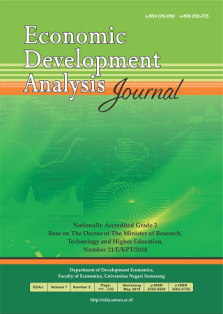Performance of Manufacturing MSEs in Bali Amidst the Covid-19 Pandemic
Abstract
This study measured the impact of Covid-19 on the total revenue of manufacturing micro and small enterprises (MSEs) in Bali, in aggregate and specifically by each type of 2-digit ISIC. Using the Cobb-Douglas model, the impact of fixed capital, the number of labors, and factors related to technical inefficiency were also evaluated. According to the findings, total revenue decreased by about one-fifth during the pandemic. Specifically, the significant impact was experienced by MSEs with 2-digit ISIC: 11 and 13 in the form of a positive impact and 14 in the form of a negative impact. As expected, the two input factors had positive elasticity on the total revenue. Education is the only non-statistically significant factor associated with technical inefficiency. MSEs with male entrepreneurs, productive age groups, capital that is not dominated by own capital, applying for a loan from people's business loans (KUR), and using the internet in the business process tend to perform better. Overall, technical efficiency before and during the pandemic is comparable, ranging between 40 and 80, while the decreasing distributional pattern of technical efficiency shows for some 2-digit ISIC


